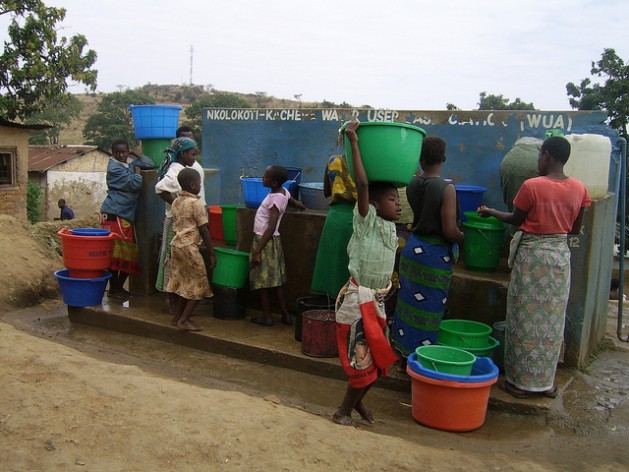Africa Can Be its Own ‘Switzerland’

A water kiosk in Blantyre, Malawi. A combination of including private equity investment and domestic resource mobilisation will help Africa unlock is financial resources to drive its development. Credit: Charles Mpaka/IPS
- Africa has the capacity to access at least 200 billion dollars for sustainable development investment but it will remain a slave to foreign aid unless it improves the climate for investment and trade and plugs illicit financial flows, development experts say.
“Africa is not poor financially but it needs to get its house in order,” Stephen Karingi, director of regional integration, infrastructure and trade at the United Nations Economic Commission for Africa (ECA), told IPS during the commission’s Ninth African Development Forum, which is being held in Morocco from Oct. 13 to 16.
“For too long we have allowed the narrative of Africa to be one about raw materials and natural resources coming out of Africa, yet Africa can take advantage of its own comparative advantages, including these natural resources, and become the leader in the value chains that require these raw materials.”
Research by the ECA shows that the total illicit financial outflows in Africa over the last 10 years, about 50 billion dollars a year, is equivalent to nearly all the official development assistance received by the continent.
“Africa is ready for transformation and we have the continental frameworks [for it],” said Karingi.
A combination of luring private equity investment, remittances and domestic resource mobilisation will help Africa unlock is financial resources to drive its development.
Sub-saharan Africa has one of the highest number of hungry people and has a growing youth population in need of jobs.
According to the McKinsey Global Institute, GDP growth has averaged five percent in Africa in the last decade, consistently outperforming global economic trends. This growth has been boosted by, among other factors, improved governance and macroeconomic management, rapid urbanisation and expanding regional markets.
Currently Africa is estimated to have a 100-billion-dollar annual funding gap for infrastructure development with about 45 billion dollars of this set to come from domestic resources.
Carlos Lopes, ECA executive secretary, said developing countries must strive to mobilise additional financial resources, including through accessing financial markets. He added that at the same time developed countries must honour the financial commitments they have made in international forums.
“The continent must embark on reforms to capture currently unexplored or poorly-managed resources,” Lopez said.
This is the first time that the Africa Development Forum has focused on the continent’s development.
Discussions focused on enhancing Africa’s capacity to explore innovative financing mechanisms as real alternatives for financing transformative development in Africa.
It aims to forge linkages between the importance of mainstreaming resource mobilisation and the reduction of trade barriers into economic, institutional and policy frameworks, and advancing the post-2015 development goals.
Macroeconomic policy division head at ECA, Adama Elhiraika, told IPS that the new sustainable development goals present an opportunity for Africa to excel by prioritising its development issues.
Elhiraika said Africa has all the ingredients to be a financial hub and investment magnet along the lines of “Switzerland” if only it can improve its investment and trade climate, tackle corruption and raise money internally.
“We need to get our policies right and allow for the kind of investments that people [can make] in Switzerland,” Elhiraika said.
“Given the size of Africa, there is need to promote free movement of capital, which is as important as the free movement of goods and services in boosting trade and investment.”
According to the World Bank, of the 50 economies that recorded improved in their regulatory business environment in 2013, 17 are from Africa, with eight of those economies being ranked ahead of mainland China, 11 ahead of Russia and 16 ahead of Brazil.
Edited by: Nalisha Adams
http://www.ipsnews.net/2014/10/africa-can-be-its-own-switzerland/
 Print
Print
No comments:
Post a Comment